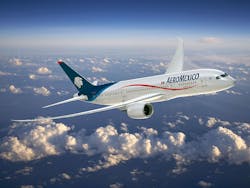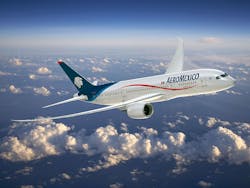Latin American airlines to triple fleet, add 3,050 new airplanes by 2035, Boeing analysts say
SANTIAGO, Chile, 30 March 2016. Latin American airlines will need 3,050 new airplanes valued at $350 billion in the next two decades, tripling the region’s current fleet size, according to Boeing analysts.
“Over the long term, Latin American economies will grow faster than the rest of the world,” says Boeing Latin America President Donna Hrinak. “This growth will create increased passenger traffic in the region and drive Latin American airlines to expand and compete for business that has traditionally been dominated by foreign operators.”
To meet increased passenger traffic, Boeing forecasts the region will require more than 2,500 new single-aisle airplanes over the next 20 years, reflecting the continued growth of low-cost carriers and further expansion of networks in the region.
Demand for wide-body aircraft is forecasted at 340 new airplanes as regional carriers continue to compete more strongly on long-haul routes.
Latin America and the Caribbean now feature a younger fleet than the world average. Average airplane age in the region’s fleet continues to drop, going from more than 15 years in 2005 to less than 10 years today, officials say. The region has been in a steady replacement cycle since the mid-2000s and that trend will continue as nearly 60 percent of the current fleet is replaced over the next two decades.
LATAM, Avianca, and Aeromexico have added the 787 Dreamliner to their fleets, enabling the airlines to open new routes and gain access to markets that were previously not possible. Aeromexico operates a nonstop 787 Dreamliner flight from Mexico City to Tokyo, a route that previously required a refueling stop.
“Boeing products will continue to help our Latin American customers succeed in a very competitive marketplace,” Hrinak adds.
You might also like:
Subscribe today to receive all the latest aerospace technology and engineering news, delivered directly to your e-mail inbox twice a week (Tuesdays and Thursdays). Sign upfor your free subscription to the Intelligent Inbox e-newsletter at http://www.intelligent-aerospace.com/subscribe.html.
Connect with Intelligent Aerospace on social media: Twitter (@IntelligentAero), LinkedIn,Google+, and Instagram.
Intelligent Aerospace
Global Aerospace Technology NetworkIntelligent Aerospace, the global aerospace technology network, reports on the latest tools, technologies, and trends of vital importance to aerospace professionals involved in air traffic control, airport operations, satellites and space, and commercial and military avionics on fixed-wing, rotor-wing, and unmanned aircraft throughout the world.



